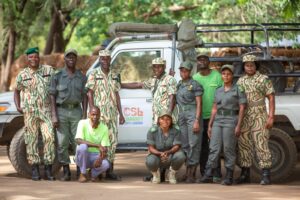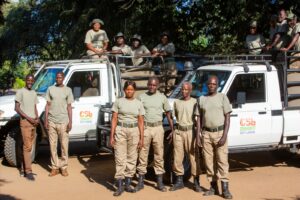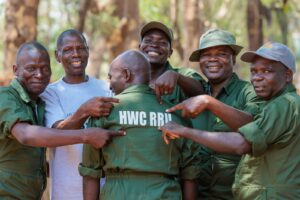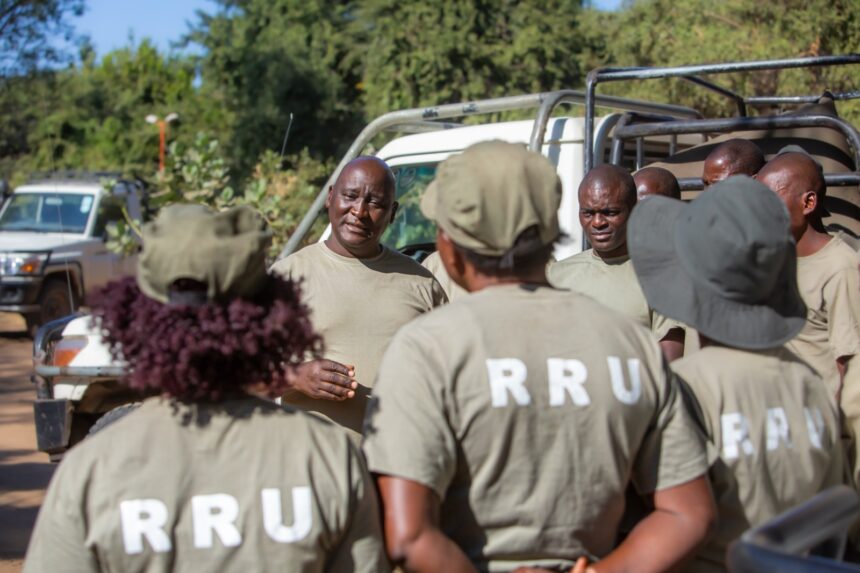In the early morning light of South Luangwa, the stillness of the bush is often broken by the trumpeting of elephants near village farms or the splash of a hippo along a riverbank. In these moments, the line between danger and peaceful coexistence is thin. But thanks to a dedicated team of first responders, these encounters are increasingly ending in safe outcomes for both people and wildlife.

Recognising the growing challenge of human-wildlife conflict (HWC) near protected areas, the Zambian government and conservation partners have taken proactive steps to promote coexistence. In 2021, Conservation South Luangwa (CSL) and the Department of National Parks and Wildlife (DNPW) launched Zambia’s first 24/7 Human-Wildlife Conflict Rapid Response Unit (RRU), a groundbreaking initiative in the heart of the Luangwa Valley.
The formation of the RRU marked a significant turning point in conservation efforts in Zambia. Human-wildlife encounters were increasing, particularly as environmental changes, such as prolonged droughts, pushed wildlife closer to human settlements. Traditional approaches to handling these incidents were no longer enough.

The RRU brought a new level of organisation and readiness. Initially, a small team led by a DNPW Problem Animal Control Officer (PACO) and Billy, a CSL employee, served as the first responders. But the scale of the need quickly became apparent. With support from the Elephant Crisis Fund, CSL and DNPW expanded the RRU to 18 members and established three rotating teams. This enabled quicker response times across a vast landscape, particularly in addressing Human-Elephant Conflict (HEC), a significant concern in the region.
DNPW provides operational oversight, ensuring that the unit aligns with national conservation goals. CSL provides support through resources, training, and on-the-ground coordination. This partnership model is key to the unit’s success.
Every week, one team is on call, ready to respond to incidents involving elephants, hippos, crocodiles, and other wildlife. They work around the clock, often navigating rough terrain in Land Cruisers to reach remote communities.
“The day-to-day work is demanding and unpredictable,” says Bernard Phiri, RRU Manager. “But when we can safely guide an elephant back to the park and ensure no one is harmed, it’s worth every effort.”

The impact has been significant. In 2023, 12 people lost their lives in incidents related to wildlife. In 2024, that number dropped to just three. Improved response times have enabled the quick transportation of injured individuals to medical care, while also safely deterring animals from populated areas.
Yet the RRU’s work goes beyond emergency response. During droughts, when wildlife movement intensifies, the team balances urgent interventions with longer-term planning, helping communities prepare and adapt to these seasonal patterns.
Importantly, while deterring elephants and other animals is part of the job, human life always takes priority. The team adheres to strict guidelines to minimise harm to animals, employing non-lethal methods whenever possible.
At the core of the RRU’s mission is building understanding. The team regularly hosts community meetings and shares conservation messages through radio programmes on Mnkhanya Radio Station 88.3 FM in Mfuwe. These programmes provide guidance on how to avoid risky encounters and how to respond safely if they happen.
By working closely with residents, the team helps shift perceptions and attitudes. Wild animals are no longer seen solely as threats, but as part of a shared environment, one that requires care and respect.
Farmers receive advice on sustainable agricultural practices to reduce crop damage. Children learn about animal behaviour and conservation through outreach programmes. Through these efforts, a culture of coexistence is emerging.
“We want communities to be empowered,” Bernard explains. “Not just to call us in an emergency, but to prevent conflict before it starts.”
In November 2024, the RRU received the African Conservation Awards’ Best Ranger Team award. This proud moment recognised not only their bravery and skill but also their dedication to protecting both people and wildlife.
Still, challenges remain. With limited vehicles and personnel, the team must carefully prioritise calls. The size of the region and the unpredictability of nature add pressure. But through strong collaboration with DNPW, local leaders, and international partners, the team continues to adapt and grow.
Their long-term vision is clear: a future where communities can manage conflict independently, supported by knowledge, resources, and a shared commitment to conservation.
The work of the RRU offers a hopeful blueprint for how humans and wildlife can coexist peacefully. It’s not about eliminating conflict entirely, but about responding wisely, preparing proactively, and working together.
In South Luangwa, the story of conservation is no longer just about protecting animals or supporting communities; it’s about doing both. And in the space between the wild and the human world, the RRU is helping to write a new chapter: one of harmony, resilience, and respect.











